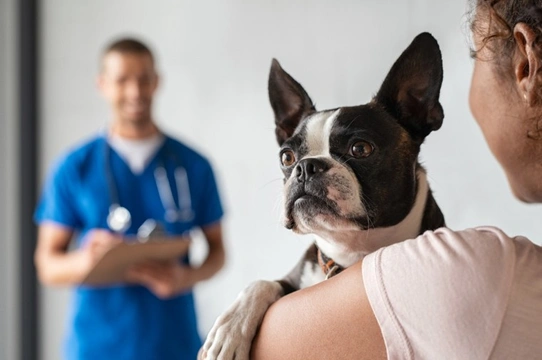
What can your dog still go to the vet for during social distancing coronavirus restrictions?
Coronavirus social distancing regulations have already had a dramatic impact on how we in the UK live and interact with each other; non-essential customer-facing businesses are closed, and when and how we visit shops and use services that are deemed as essential and that remain open have all changed significantly too.
When it comes to social distancing and veterinary services, vets remain open to ensure that we can take care of the most basic and essential needs of our pets, and to prevent harm and suffering; but like all other businesses, including GP surgeries for people, what they do, what they offer, and how their services are delivered have all changed.
This means that many of the normal, everyday services that your vet would usually offer will not be available, and this includes some services that relate directly to things like preventative healthcare and non-urgent care, and this is proving to be a source of some confusion for dog owners.
Preventative healthcare and routine services are really important for dogs and tend to be heavily promoted by vets, and so even given the coronavirus restrictions, learning that some of these things are not available is coming as a bit of a shock. However, these are not normal times, and whilst vets are working hard to prevent animal suffering and preserve animal life, human life, and the greater good of the people of the UK over and above that of pets, has to take precedence.
Bearing this in mind, this article will answer some of the most common questions dog owners are asking vets about the care they are offering during social distancing restrictions, and what dogs can be taken to the vets for during coronavirus containment measures.
What care are vets offering during social distancing restrictions?
Vets are offering only essential and emergency care during the coronavirus social distancing restrictions. This means that a huge number of their services are not available, or will be delivered rather differently.
- Emergency veterinary care during social distancing restrictions remains available, which means your dog can see the vet if they are injured, currently sick, or need to be examined to determine if either of these things are the case.
- Essential veterinary care during social distancing is also available, which means that if failing to see the vet would cause or worsen any pain or suffering, or lead to or prolong avoidable distress in your dog, they can still be seen.
These two things – if treatment either essential, or in an emergency – are the benchmarks your vet will apply to determine if your dog can be seen. Routine and preventative treatments will be deferred or delayed, as they do not meet these benchmarks.
Many services that are usually handled in clinic can still be delivered remotely; such as consults for certain things taking place by video and phone, and the repeat issuing of prescriptions. If a prescription is needed in an emergency, this meets the emergency or essential care benchmark and so will result in the prescription being handled in-house.
Can my dog go to the vet if he is ill during social distancing?
Yes. If your dog is sick, appears to be getting sick, or otherwise needs care to diagnose what is wrong and to prevent or end pain, suffering or distress, your vet will see them.
They are highly likely to triage by phone to determine if the situation warrants a face to face visit, and this means that some illnesses that your vet diagnoses as minor, short term and definitive, may not require a trip to the clinic.
Can my dog go to the vet if he is injured during social distancing?
Yes. If your dog is hurt and this is not minor, transient and apt to go away in short order without causing pain, distress or suffering, your dog can see the vet. Once more, expect your vet to triage the issue by phone first.
Can my dog go to the vet if something is wrong but I won’t know what?
Yes. If you know that something is wrong with your dog but don’t know what, and your vet cannot make a firm diagnosis and assess the seriousness of the situation on the phone, they will ask you to take your dog to the clinic.
This is because failing to do so might cause or worsen pain, distress or suffering.
Can my dog go to the vet for ongoing treatments like chemotherapy?
If your dog is undergoing a course of treatment for a serious health condition that cannot be paused without risking your pet’s life or causing pain, distress or suffering, your vet will make arrangements to continue treatment.
Can my dog go to the vet for the investigation and treatment planning of health conditions like diabetes?
If your vet is trying to diagnose a condition, work out the appropriate treatment and monitoring regime for a health condition, or needs to make changes or monitor an existing treatment regime and failing to do so would cause pain, distress or suffering, your dog can go to the vet.
However, routine check-ins or monitoring in the form of regular maintenance appointments might be deferred as non-essential.



